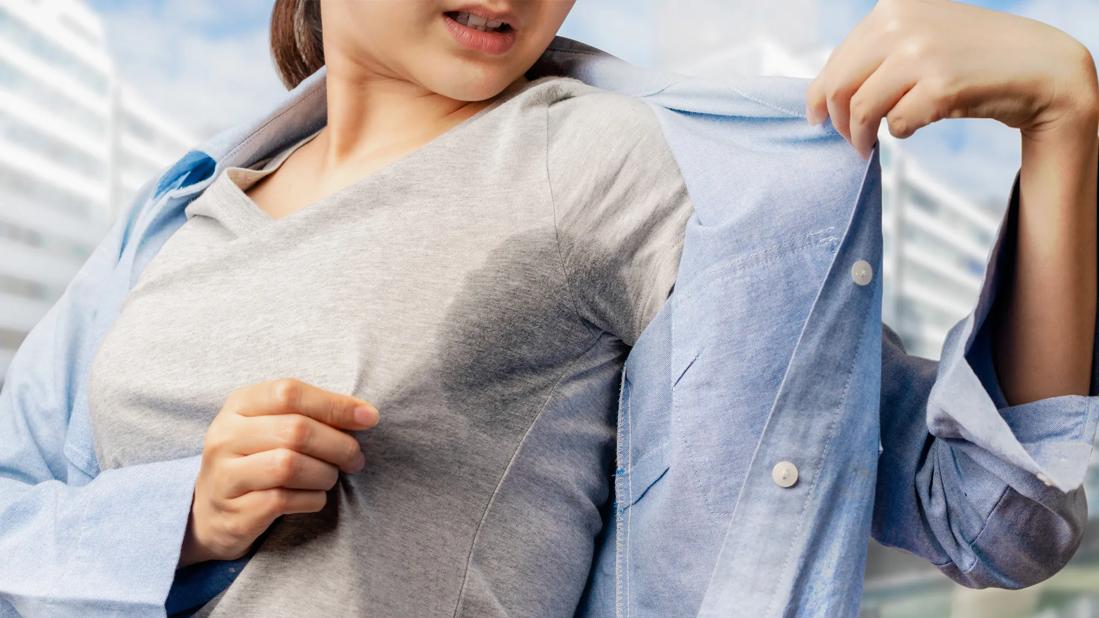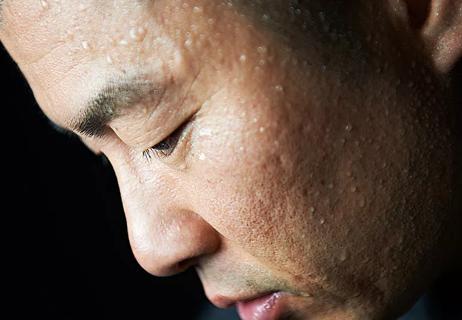Exercise, weather, anxiety, hormone changes and spicy foods can cause you to perspire more than usual

We all sweat. But for some of us, we may sweat a little too much.
Advertisement
Cleveland Clinic is a non-profit academic medical center. Advertising on our site helps support our mission. We do not endorse non-Cleveland Clinic products or services. Policy
That can lead to embarrassing moments where our underarms, hands and other parts of our bodies are visibly sweaty.
So, why do I sweat so much? If you wonder this often, you may have hyperhidrosis, a condition where your body’s sweat glands are overactive. It can cause you to perspire in spots where others don't and at inconvenient times.
About 2% to 5% of people in the U.S. have hyperhidrosis. But that number could be higher, as many don’t talk about their symptoms even though they have trouble managing their sweat.
Nurse practitioner Melissa Holtz, CNP, discusses what it means when you sweat a lot and what you can do to help manage excessive sweating.
It can be hard to measure your sweat and know exactly how much you sweat each day. It’s estimated that the average person may sweat around 500 milliliters per day.
When your body’s temperature gets too high, your sweat glands start working to cool your body down. Ideally, you want to keep your body at 98.6 degrees Fahrenheit (37 degrees Celsius).
“Sweating actually assists with your body’s thermal regulation, skin hydration and helps balance our fluids and electrolytes,” explains Holtz.
So, why do some sweat more than others?
When you have hyperhidrosis, your sweat glands work too hard, producing sweat you don’t need.
Advertisement
“When we’re sweating too much, it’s thought to be an abnormal or an exaggerated central response to normal emotional or physical stimuli,” she says. “Usually, the glands themselves are normal. You’re just having an exaggerated response to normal stimuli.”
So, while you may not be able to measure how much you sweat, if you feel self-conscious about the amount you’re sweating, frequently sweat through your clothing or find your sweating is interfering with your life, don’t hesitate to talk to a healthcare provider.
It’s a valid question and one that can have many possible answers. Here are some common reasons you might be sweating a lot.
When you work out and elevate your heart rate, your body’s temperature increases. That kickstarts your sweat glands and you start to perspire. On average, you may lose about 2 liters of fluid while exercising. Drinking water before, during and after your workout is key to replacing lost fluids and cooling your body down. It can also help prevent dehydration.
We can all relate to hot, humid summer days where just a short trip outside can make you a sweaty mess. When temperatures soar, the chance of sweating increases. Also, hot, humid air makes it harder for sweat to evaporate off your body.
Consuming alcohol, even just one drink, can increase your heart rate and widen blood vessels in your skin. This can make you sweaty. If you’re going through alcohol withdrawal, you can have excessive sweating and even night sweats.
“Alcohol consumption disrupts the communication between the nervous and endocrine systems,” shares Holtz. “This causes hormonal disturbances, which can lead to sweating.”
In some cases, excessive sweating may be caused by a medical condition like hyperthyroidism, diabetes, Graves’ disease, Parkinson’s disease or spinal cord injuries. If you think your excessive sweating is the result of a specific medical condition, it’s important to talk to your healthcare provider who can provide more information.
Certain medications like antidepressants, nonsteroidal anti-inflammatory drugs (NSAIDs), blood pressure medications and diabetes medicines can make you sweat. If you think this may be the cause, you can discuss options with your doctor.
Stress hormones can trigger your sweat glands. They raise your heart rate and blood pressure, leading to an increase in your body’s temperature. Emotional stress can lead to sweating on the palms of your hands and the soles of your feet, too.
Advertisement
You’ve heard of hot flashes — or may have experienced them yourself. During menopause, your estrogen levels go up and down. This makes it difficult for your hypothalamus (an area in your brain that controls temperature) to know if it needs to cool your body down or not. Hot flashes are the result — your body thinks it’s overheating, so your sweat glands go into overdrive. You may feel hot, clammy and sweaty.
If you’re sick, your body raises its temperature a few degrees. You may experience chills at first as your body tries to fight off whatever bug you may have. Then, as your fever breaks, you’ll feel hot and sweaty as your body works to regulate its temperature back to normal.
What you eat and drink can affect how much you sweat. Drinking coffee or anything with caffeine activates your central nervous system, which controls your sweat glands. Even spicy foods like hot sauce and jalapenos can trigger your sweat glands.
“If you’re drinking two cups of coffee, you should drink two glasses of water to balance it out and stay hydrated,” advises Holtz.
Excessive sweating typically begins to show during childhood. To be diagnosed with hyperhidrosis, you must experience excessive sweating for at least six months and rule out any other medical reasons.
Advertisement
To help manage your extra sweat, Holtz suggests trying out these methods:
Advertisement
Why am I always sweating? There can be a variety of reasons why you’re sweating more than usual. But the biggest takeaway? You don’t have to suffer in silence, says Holtz.
Those with hyperhidrosis struggle in many social situations due to their excessive sweating, making it an emotional topic for them. But if you’ve tried multiple ways to manage your excessive sweat, consider seeing a doctor.
And there’s no need to be embarrassed.
“Don’t be worried that you’re not doing something right,” reassures Holtz. “Excessive sweating happens and there’s nothing you did that caused this.”
Learn more about our editorial process.
Advertisement

It can be a warning sign of low blood sugar or something more serious like a heart attack

Stay cool by wearing breathable clothes, eating certain foods and using an antiperspirant

One reduces the amount of sweat, while the other masks body odor

Tackle perspiration and odor by wearing breathable fabrics, showering after exercising and using an absorbent powder

The sweaty truth: why sweet smells turn foul

Home remedies are unlikely to cure your contagious foot fungus — and they might even make it worse

Earlobe piercings heal quicker and are less painful than cartilage piercings — proper cleaning and care are important

Some treatments may temporarily reduce the appearance of puckered and dimpled skin

If you’re feeling short of breath, sleep can be tough — propping yourself up or sleeping on your side may help

If you fear the unknown or find yourself needing reassurance often, you may identify with this attachment style

If you’re looking to boost your gut health, it’s better to get fiber from whole foods